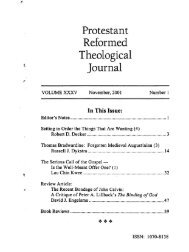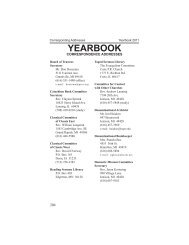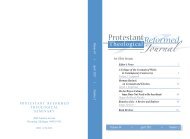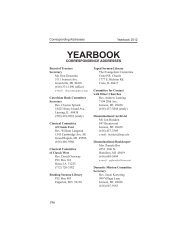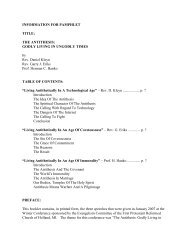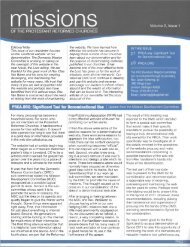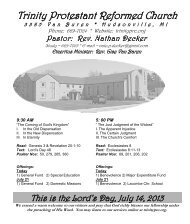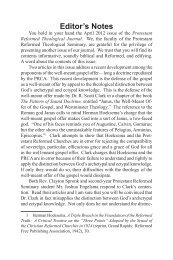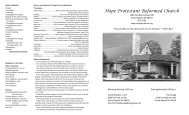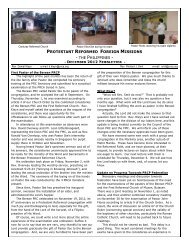November 2007 - Protestant Reformed Churches in America
November 2007 - Protestant Reformed Churches in America
November 2007 - Protestant Reformed Churches in America
You also want an ePaper? Increase the reach of your titles
YUMPU automatically turns print PDFs into web optimized ePapers that Google loves.
Book Reviews<br />
ber of respects, they both deny torically used to teach the imputation<br />
of the righteousness of<br />
justification by faith alone.<br />
Five chapters deal with the Jesus Christ. In addition to<br />
issue of justification, the righteousness<br />
of Christ, which is zealously defend<strong>in</strong>g this doc-<br />
these exegetical reasons for<br />
imputed <strong>in</strong> justification, and the tr<strong>in</strong>e, he f<strong>in</strong>ds another: “the<br />
legal aspect of the imputation. honor and glory of the Lord<br />
The first two chapters deal Jesus Christ” (p. 97).<br />
particularly with N. T. Wright’s C. FitzSimons Allison demonstrates<br />
that Anglicanism has<br />
teach<strong>in</strong>g regard<strong>in</strong>g justification.<br />
Cornelis Venema summarizes<br />
N. T. Wright’s view re-<br />
imputation that it once held; ar-<br />
lost the right understand<strong>in</strong>g of<br />
gard<strong>in</strong>g the NPP and his doctr<strong>in</strong>e<br />
of justification. He then tr<strong>in</strong>e proceed from a fear of<br />
gues that objections to the doc-<br />
demonstrates from the New ant<strong>in</strong>omianism; and <strong>in</strong>dicates<br />
Testament, and especially that our culture, which speaks<br />
Paul’s epistles, that Wright’s of God’s love at the expense of<br />
view is wrong. Then T. David God’s justice, rather than see<strong>in</strong>g<br />
God’s love <strong>in</strong> proper rela-<br />
Gordon deals more specifically<br />
with Wright’s view of the term tion to His justice, fosters a disregard<br />
for the idea of imputa-<br />
“the righteousness of God.”<br />
Whereas Wright argues that the tion. In defense of imputation,<br />
term is not to be understood <strong>in</strong> he notes: “Imputation is the<br />
a forensic sense, but refers to unanimous testimony of sa<strong>in</strong>ts<br />
the faithfulness of God, Gordon<br />
argues from Paul’s epistles pleads one’s own <strong>in</strong>fused righ-<br />
on their death beds. None<br />
that the term must be understood<br />
<strong>in</strong> a judicial sense. the mercy of Christ” (p. 103).<br />
teousness before God but only<br />
The next two chapters deal To skip chapter 5 for the<br />
with the doctr<strong>in</strong>e of the imputation<br />
of Christ’s righteousness. VanDrunen defends sola fide <strong>in</strong><br />
moment, <strong>in</strong> chapter 6 David<br />
Review<strong>in</strong>g the Arm<strong>in</strong>ian challenge<br />
to this doctr<strong>in</strong>e <strong>in</strong> decades of Christ. VanDrunen argues<br />
relation to the active obedience<br />
past, Richard Phillips shows that the idea of Christ’s active<br />
that the NPP denies it today. He obedience is basic to a <strong>Reformed</strong><br />
understand<strong>in</strong>g, and that<br />
defends the doctr<strong>in</strong>e by exam<strong>in</strong><strong>in</strong>g<br />
several texts that <strong>Reformed</strong><br />
theologians have his-<br />
both of the NPP and the Federal<br />
the idea is dismissed by men<br />
<strong>November</strong> <strong>2007</strong> 105



